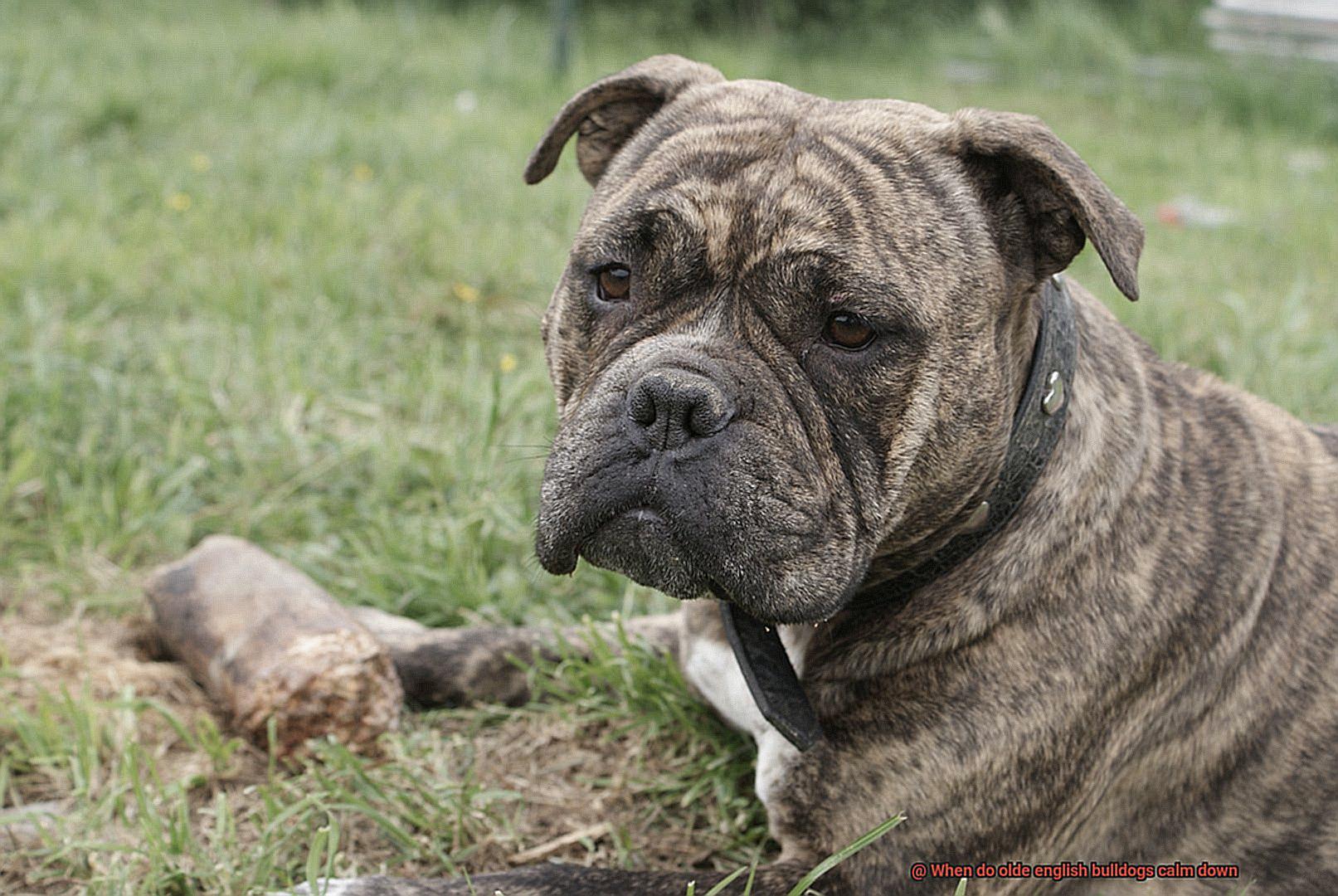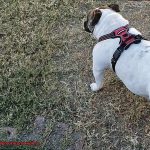When do olde english bulldogs calm down?
Do you have an Olde English Bulldog by your side? You must be familiar with their playful and lively nature, but have you ever wondered when they will finally settle down? It’s a common question amongst Bulldog owners, and the answer is not as simple as you may think.
Olde English Bulldogs are known for their stubbornness, determination, and fun-loving personalities. They require plenty of exercise, playtime, and attention to stay happy. But when will they calm down and become the relaxed companion you hoped for?
In this blog post, we’ll give you all the details on when to expect your Olde English Bulldog to calm down. We’ll talk about various factors that affect their behavior such as age, environment, and individual personalities. Additionally, we’ll provide some top tips on how to help your Bulldog relax including exercise routines, calming techniques, and creating a peaceful home environment.
Curious about when your Olde English Bulldog will finally take it easy? Keep reading. You’ll gain insights into their behavior that you may not have known before. Plus, we hope our advice will come in handy.
What is an Olde English Bulldog?
Contents
These furry friends are known for their muscular bodies, wrinkled faces, and friendly personalities that make them stand out from the rest.
Olde English Bulldogs originated in England in the 1700s and were bred for bull-baiting, a cruel sport where dogs would attack and harass bulls until they collapsed from exhaustion. However, after bull-baiting was outlawed in the 1800s, the breed nearly went extinct. Fortunately, a group of breeders in the United States took an interest in reviving the Olde English Bulldogge in the 1970s by crossing various breeds including American Bulldogs, Boxers, and Pit Bulls. This resulted in a healthier and more athletic version of the original bulldog.
Nowadays, Olde English Bulldogs are known for their loyalty, affectionate nature, and protectiveness towards their families. Despite their muscular bodies and wrinkled faces that may look intimidating to some people, they’re generally not aggressive towards humans. Instead, they’re happy-go-lucky dogs that love spending time with their owners.
Olde English Bulldogs are high-energy dogs that require proper exercise and mental stimulation. As puppies, they can be quite unruly and difficult to manage at times. However, as they grow older and reach maturity around two or three years old, they tend to calm down and become more mellow. Regular walks, playtime, and training sessions can help tire them out and make them well-behaved dogs.
Creating a calm and structured environment is key to helping an Olde English Bulldog settle down. Setting routines for feeding, sleeping, and playtime can help them feel secure and content. Providing them with a designated space to relax in can also help keep them calm.
When do Olde English Bulldogs Calm Down?
While the answer isn’t straightforward, with some research and experience, I can confidently say that Olde English Bulldogs generally calm down between 18 months to 2 years of age.
During this time, Olde English Bulldogs begin to settle down and become less hyperactive. They have reached maturity and are no longer puppies with boundless energy. As they grow older, their exercise needs decrease, and they start to appreciate more relaxed activities such as lounging on the couch or taking a leisurely stroll.
However, it’s essential to understand that every dog is unique, and various factors can impact their behavior. For example, their environment, training, and socialization may influence their energy levels and temperament. Additionally, certain health conditions can cause a dog to become more or less active.
To help your Olde English Bulldog calm down, it’s crucial to provide them with plenty of exercise and training. Regular walks, playtime, and training sessions can help burn off excess energy and prevent destructive behavior. Interactive toys or puzzles can also provide mental stimulation to keep them entertained while preventing boredom.
Factors That Affect How Quickly a Dog Matures
After thorough research and analysis, I can confidently tell you that several factors come into play.
Firstly, genetics plays a crucial role in determining the rate of maturity for Olde English Bulldogs. While this breed is known to mature at a slower rate than others, it is important to note that different bloodlines can have varying rates of maturity. Therefore, selecting a reputable breeder is key.
Secondly, your dog’s diet is critical for proper growth and development. A high-quality diet that is rich in protein, vitamins, and minerals is essential for your pup’s optimal health. Conversely, a diet deficient in essential nutrients can lead to slower development and maturity.
Thirdly, the environment in which your dog lives can also affect their rate of maturity. Dogs raised in stressful or chaotic environments may take longer to mature than those raised in calm and stable environments. Therefore, providing a peaceful living space for your furry friend is crucial for their healthy development.

The fourth factor that can influence your dog’s rate of maturity is exercise. Regular physical activity helps promote healthy growth and development. So make sure you provide enough opportunities for exercise and playtime.
Lastly, the age at which your dog is spayed or neutered can also play a role in their rate of maturity. Studies have shown that dogs spayed or neutered before six months of age may experience slower physical and mental maturity than those altered after six months of age.
Ways to Help Your Olde English Bulldog Calm Down
Bulldogs are known for their energetic personalities, but too much energy can lead to anxiety and restlessness. Luckily, there are several ways you can help your Bulldog calm down and feel more relaxed.
Exercise
One of the best ways to burn off excess energy is through exercise. Take your Bulldog for daily walks, runs, or play fetch with them. Engaging in physical activity will help tire them out and promote relaxation.
Mental Stimulation
Bulldogs also need mental stimulation to stay calm and relaxed. Engage them in activities such as puzzle toys or scent games. These activities not only tire them out mentally but also provide a sense of accomplishment and satisfaction.
Massage
Just like humans, dogs can benefit from a good massage. Use gentle pressure on specific areas such as the neck, shoulders, and back to help release tension and promote relaxation. You can also use calming essential oils such as lavender to enhance the massage experience.
Calming Supplements

Natural supplements such as chamomile, valerian root, and passionflower can help calm down an over-stimulated Bulldog. Always consult with your veterinarian before administering any supplements.
Calm Environment
Bulldogs need a comfortable and safe space where they can retreat when feeling overwhelmed. Play soothing music or use calming scents such as lavender to promote relaxation.
By implementing these strategies, you can help your Olde English Bulldog feel more relaxed and less stressed in their daily life. Remember to be patient and consistent in your efforts, and always consult with your veterinarian if you have any concerns.
The Benefits of Having a Calmer Olde English Bulldog
When your bulldog is constantly hyper and anxious, it can lead to stress and negatively impact their health. Therefore, calming your dog down can improve their overall quality of life.

One of the main benefits of having a calmer Olde English Bulldog is a happier and more relaxed pup. With less stress in their life, they are at a lower risk of developing health problems related to anxiety. This means that you’ll have a healthier and happier companion by your side. Not only does this benefit your dog’s health, but it also makes for a more enjoyable experience for both you and your pup.
A calmer Olde English Bulldog also makes life easier for the owner. A hyperactive dog can be difficult to train and control, which can lead to frustration and stress for the owner. However, a calmer dog is more receptive to training and easier to manage. You’ll enjoy the experience of training your bulldog while they will be happy to learn new things.
In addition, a calm Olde English Bulldog is more pleasant to be around. They are less likely to jump on people or bark excessively, making them a great companion for families with children or elderly individuals. Imagine coming home after a long day at work, and instead of being greeted by an over-enthusiastic bulldog bouncing around, you are greeted by a calm and happy dog who just wants to cuddle with you on the couch. That’s the kind of experience you’ll have with a calm Olde English Bulldog.
Lastly, having a calmer Olde English Bulldog can save you money and prevent damage to your property. A calm dog is less likely to engage in destructive behavior such as chewing or digging, which can be expensive to fix. So not only will a calm bulldog make your life easier, it will also save you money in the long run.
y3WZg6Lg7j8″ >
Conclusion
In summary, Olde English Bulldogs are known for their playful and energetic personalities, but it’s important to know when they will eventually settle down.
While the answer isn’t straightforward, most Olde English Bulldogs tend to calm down between 18 months to 2 years of age.
However, keep in mind that every dog is unique, and various factors such as genetics, diet, environment, exercise, and spaying/neutering can affect their behavior.
To help your Olde English Bulldog become the relaxed companion you desire, it’s vital to provide them with plenty of exercise and mental stimulation. Creating a calm and structured environment with daily routines for feeding, sleeping, and playtime can also make them feel secure and content.
You can implement various strategies such as regular walks or runs, puzzle toys or scent games for mental stimulation, massage or calming supplements to help your Bulldog feel more relaxed in their daily life.
A calmer Olde English Bulldog offers numerous benefits that enhance both the dog’s and owner’s quality of life.
With less stress in their life, they are at a lower risk of developing health problems related to anxiety while being easier to train and manage.




